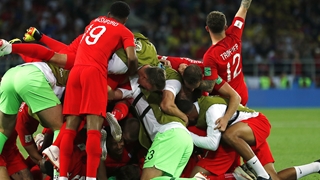
Emotional control
Adversity and challenge presented themselves in many forms on Tuesday evening as England’s young squad endured a long and testing - but ultimately successful - evening against Colombia.
From the disappointment of an equaliser in the dying seconds of normal time, intimidation from the opposition, as well as all that accompanies a penalty shootout, Gareth Southgate’s squad were confronted with numerous psychological challenges.
Impressively, each was dispatched with calm but focused conviction. Something that, accompanied to their developing style of play, is becoming a strong signature of this team.
Harry Kane’s single-mindedness during his delayed 57th minute penalty acted as a perfect example of clear focus under immense pressure. The positive body language exuded throughout the penalty shootout was another sign of the psychological development of this side.
It wasn’t only on the pitch that composure was demonstrated. The Three Lions’ manager and his staff have displayed a calming assuredness on the touchline when emotions could have tempted them otherwise. It has allowed for clear decision-making in the technical area and set the tone for a calm authority on the pitch.
The importance of developing robust psychological skills - in both players and coaches - is a crucial part of the FA coaching pathway and given significant prominence as part of the FA level 4 (UEFA A), FA Advanced Youth Award and FA level 5 (UEFA Pro Licence) courses. After the draining impact of Tuesday night, you can see why.
Possession from a back three
Psychological strength was also demonstrated in the way England played against Colombia. Most notably in the confidence and control displayed when building play through goalkeeper, Jordan Pickford, and the back three of Kyle Walker, John Stones and Harry Maguire.
When Colombia tried to aggressively press England’s backline, it would have been easy to pass responsibility and opt to play long, safe balls into opposition territory. Instead, England’s build-up play was defined by composure.
As was the case in the group stage victories over Panama and Tunisia, England’s tactical system routinely afforded them a numerical overload when playing out against Colombia’s attacking players. Patience in possession simply allowed avenues into midfield to emerge.
When England’s back unit found those routes forward blocked, the technical ability, supporting angles and passing range of Pickford provided a creative outlet behind the defence in order to begin new attacking moves.
The approach to distribution meant the ball was rarely played long without thought, allowing possession, energy and rhythm to be intelligently managed. An element of the game that proved crucial on a night when calmness could easily have evaporated.
Throughout the FA coaching pathway, coaches are encouraged to think about their own coaching philosophy and how this links to how they want their team to play. The crucial test for both comes in those moments when pressure begins to mount.
So far, England’s performances in Russia have demonstrated robustness in their playing identity and a desire to implement their football ideas on the opposition rather than be dictated to. Much of this begins with the values, beliefs and behaviour of the staff involved.
Beating the block and positional rotation
Saturday’s quarter final against Sweden will present further psychological and tactical challenges. The deep defensive block favoured by England’s opponents has already been used by many teams in the tournament to frustrate and suffocate opponents – particularly those that value possession. We touched on this in the first of our World Cup tactical analysis series.
England’s belief in positional interchange and variety of attacking movement and forward passing, shown in spells against Colombia, could be crucial in unlocking the Swedish backline.
Understanding the tactics and trends of the modern game is a core strand running through FA Education courses.
The FA Level 4 (UEFA A) course is dedicated to studying the systems and styles of the modern elite game. Throughout the 18-day course – broken into six blocks of three days – candidates are challenged to develop the skills necessary to prepare for scenarios such as the one faced by Gareth and his squad on Saturday.
Analysing individuals, units and teams and translating the information into both on and off field coaching sessions is a core part of the course.
In the same way England’s analysis and scouting staff will have worked as part of a multi-disciplinary team to deliver analysis content to the players in Russia, coaches on the course are challenged to live code games and sessions and prepare team meetings for senior coaching staff and players.
With recovery in international football paramount and only short spells spent on the grass with players, this is very much a key role for an elite coach.
Transferring theory to practice is the challenge faced by all, including, most crucially, all those involved on Saturday.











